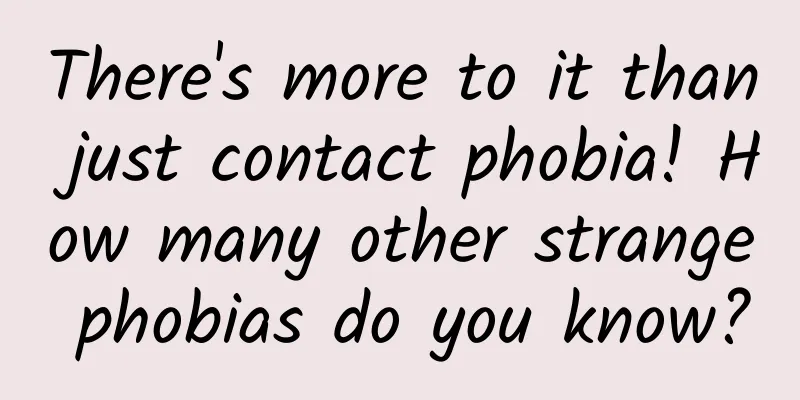There's more to it than just contact phobia! How many other strange phobias do you know?

|
Author: Kansai Science and Technology Industry Research Institute (° ㉦ ° ) Speaking of phobias, many people here will immediately think of psychological terms such as acrophobia, trypophobia, and claustrophobia. Almost everyone knows about acrophobia. According to a foreign survey, nearly 90% of modern urban people have experienced acrophobia. In the early years, PS pictures such as "lotus breasts" and "empty fingers" were circulated on the Internet, triggering a group of netizens' trypophobia attacks. Many people travel during long holidays and can't help but shout that trypophobia is coming when they see the crowds of people. Claustrophobia is mentioned more and more with the popularization and use of elevators. In fact, in addition to the phobias we are familiar with, there are many strange phobias. The earliest names of these diseases mostly come from the West. The English suffix -phobia means a certain phobia. Compared with China, Western society has a longer history of modernization and began to pay attention to mental health earlier. It is not surprising that all kinds of -phobia have emerged today. In "Ode to Joy", Liu Tao plays the role of Andy, a rich and beautiful woman from Wall Street who suffers from physical contact phobia, which has also aroused the curiosity of some netizens who follow the drama about the psychological disease of contact phobia. "Don't, don't touch me!" ——[Aphenphosmphobia] In Ode to Joy, Liu Tao plays the role of Andy, a strong woman who returned from overseas. Due to her childhood experience, she lacks a sense of security and cannot have close contact with others, not even a simple handshake. She suffers from contact phobia. People with contact phobia cannot accept touching others, nor can they tolerate being touched by others, especially when interacting with the opposite sex. People who have suffered sexual violence are more likely to have this fear. “Oh my god, I really don’t want to attend the company dinner tomorrow!” — [Deipnophobia] As the name suggests, dinning phobia refers to the fear of dining and chatting with others. People with dinning phobia will refuse to participate in various forms of gatherings, and attending a dinner party is like going to the execution ground for them. When dining out, they often choose to eat alone. Dinning phobia can actually be regarded as one of the manifestations of social phobia. Due to the fear and anxiety of social occasions, patients will feel strong anxiety accompanied by physiological reactions such as blushing, shortness of breath, and headaches. Of course, a large part of us ordinary people will also feel slightly nervous when attending social occasions, but there will be no significant physiological reactions and it will not affect our attendance. This situation does not belong to dinning phobia. "Come and stop me, I'm going to turn into a werewolf!" - [Selenophobia] Su Shi once said, "When will the bright moon appear? I raise my cup to ask the blue sky." Li Bai's "Looking up at the bright moon, I think of my hometown" is even more popular. People often have beautiful fantasies about the moon, but some people are extremely afraid of the moon hanging high in the night sky. In fact, people with moon phobia are afraid of being driven by the moon to do some dangerous things like werewolves, and the cause is mostly due to the terrifying rumors about the moon heard in childhood. "Hippopotomonstrosesquippedaliophobia?? WTF!" ——[Hippopotomonstrosesquippedaliophobia] The English in the title means "long word phobia". Yes, patients with long word phobia are afraid of the name of the disease itself. Patients are often extremely uneasy about whether they can read the words correctly due to their low education level. Genetic factors, personality factors, and mental factors may all cause long word phobia. Some patients even avoid reading and going to places where long words may appear (such as high-end restaurants, because the probability of long words appearing in the menus used in high-end restaurants is higher). "She is like a fairy, she is so beautiful, I am so ordinary, I can't open my mouth" ——【Venustraphobia】 Many people must have heard this song by Jordan Chan. While lamenting the humbleness of the love of the characters in the song, have you ever thought about the existence of a disease called beautophobia? As the saying goes, beauties are like roses with thorns, which can be admired from a distance but not played with. Beautophobic patients will feel extreme fear and great pressure when approaching beautiful women. The reasons can be summarized into two major points. First, they have been traumatized in the process of dating beautiful women in the past and cannot get out of the shadow left by failure. Second, they lack confidence in their appearance, often feel inferior, and believe that there is an insurmountable dimensional wall between themselves and beautiful women. "God hates us! People should only look good!" - [Cacophobia] The opposite of beauty phobia is ugliness phobia. In Notre Dame de Paris, Quasimodo cried out in despair on the bell tower, "God hates us! People should only look good!" Everyone loves beauty, but judging people by their appearance is not advisable. People with ugliness phobia are not only afraid of seeing people with poor appearance, but also fear everything around them that they think is ugly. "I think I will always be alone, and I will be alone like this for the rest of my life" ——【Philophobia】 There is a type of people who feel that they cannot fall in love, cannot accept talking about love with others, are afraid of establishing a relationship, and are afraid of the sweet love that should be. This is the so-called "love phobia", and the cause is mostly due to past trauma or lack of self-confidence. Love phobia can be divided into three categories, namely fear before falling in love (rejection type, hesitant and stepping back when the opportunity comes), anxiety in love (anxiety type, worrying about gains and losses, lack of confidence in the relationship between each other) and fear after falling in love (injury type, feeling pessimistic and disappointed about love after setbacks and refusing to fall in love). Love is one of the emotions of human beings. Rejecting love is not conducive to mental health and growth, so friends, feel free to love boldly! "Don't let me hear good news!" ——[Euphobia] Everyone wants to hear good news, but people with good news phobia are afraid to hear good news that makes everyone happy and joyful. People who have experienced ups and downs are more likely to suffer from this phobia. Not only are they afraid of good news that happens to themselves, they are also disgusted by good things that happen to others. Instead, they get pleasure from unfortunate things, which is the so-called building happiness on the suffering of others. I wonder if those who believe that no news is good news will be particularly miserable in their daily lives? "I'm always smiling now" - Coulrophobia Joker is a super villain of DC Comics. One of his lines is "I am always smiling now". The Joker, who should bring laughter to people, triggers fear deep in some people's hearts. There are many different opinions on the causes of clown phobia. Some people say that the clown's human-like but non-human costume triggers people's uncanny valley effect (uncanny valley theory: the higher the degree of simulation of humanoid toys or robots, the more people like them, but when it exceeds a critical point, the favorability will drop sharply, and the more realistic it is, the more frightening it will make people feel, until it reaches the bottom of the valley of terror). Others say that it is because the terrible plots about clowns in dramas and movies have left people with psychological trauma. Seeing this, you may wonder if people with clown phobia find it difficult to enter McDonald's for a meal calmly. "Sorry, I'm allergic to peanut butter" - [Arachibutyrophobia] What? Peanut butter can also make people afraid? Yes, peanut butter phobia is a real phobia. Sufferers are afraid of peanut butter sticking to the lid or the roof of their mouth. Once peanut butter sticks to the roof of their mouth, they will show abnormal symptoms such as sweating, shaking, and itching on the roof of their mouth. "Will I have XX phobia?" ——【Phobia Phobophobia】 Although the name of phobia looks like a spoof word game, it is a real disease. Patients often worry and fear that they will become afraid of something without any external factors. There are cases where other phobias develop into phobias, and there are also cases where phobias suddenly fall into a phobia cycle. Phobias are often closely related to obsessive-compulsive disorder. In addition to the various phobias listed above, there are hundreds of phobias related to the -phobia suffix in English, such as "genuphobia", "omphalophobia", "arachnophobia", "ophidiophobia", "astrapophobia", etc. It is really amazing that there is fear everywhere in the world. Are you afraid today? I believe that after reading about these various phobias, you may, like me, slightly despise the pampered and pretentious Westerners. However, despite this disdain, we should still learn from their seriousness and persistence in caring for the mental health of the masses. So from a psychological perspective, how should we understand these phobias? If the symptoms are serious enough to require treatment, what professional methods can psychologists use to help us? There are countless phobias, and the above are just a few of them. In summary, these phobias are either conditioned reflexes to specific things or people, or some indescribable psychological feelings. In terms of causes, some are caused by trauma in childhood, some are caused by stress reactions caused by sudden events, and some are even difficult to trace. The BBC once reported in a documentary about a woman suffering from Ornithophobia. One day in her childhood, a seagull accidentally broke into her living room. The frightened seagull was eager to escape, and in a hurry, it turned the whole room upside down, not only causing considerable damage, but also bringing a lingering shadow to the parties at the scene of the accident. From then on, this woman developed a strong fear of all birds. By the time she began to receive formal professional treatment in her 40s, her symptoms had become so severe that she could not go out. The cause of her illness can probably be summarized as the combined effect of the stress response brought about by the sudden incident and the trauma she suffered in her childhood. Some people may ask, is there no way to treat these weird phobias? In fact, in addition to drug treatment, some behavioral therapies are used to treat various phobias. For example, cognitive therapy is to analyze the object of fear, make the patient understand the root and degree of fear, change the patient's attitude and view of himself, others and things, so as to achieve the purpose of overcoming psychological problems. Systematic desensitization is currently considered to be one of the safest and most effective methods for treating phobias. This method refers to exposing patients step by step to terrifying things or scenes, and by increasing the degree of fear in a step-by-step manner, so that patients can gradually adapt to the stimulation, improve their psychological threshold, and get rid of psychological distress. The flooding therapy, also known as exposure therapy, is the opposite of systematic desensitization therapy. It will present the strongest terrifying stimuli to the patient in large quantities at once to quickly correct the patient's wrong cognition of the terrifying stimulus and eliminate the fear. The woman with bird phobia mentioned above finally received systematic desensitization treatment. The general plan was to let her start by watching pictures of birds, gradually enlarge the size of the pictures, and then transition to videos and even real live birds. During this process, the doctor constantly analyzed the reasons for her fear and taught her how to relieve the body's fear reaction. In a very short period of time, she completely got rid of the haze of phobia. Perhaps some people look at these strange phobias with a curious and playful mentality, but what we need to know is that these patients themselves are suffering from pressure and pain that are not understood by ordinary people. If you have such patients around you, please respect them, understand them, and help them. Everyone has something they fear in their hearts, and there is no absolutely fearless hero. For most people, since the objects that induce fear reactions may be very rare in daily life (such as snakes or spiders), and the fear reactions can also be limited to a controllable degree, as long as you have a scientific understanding of phobias and understand that this is just a normal physiological reaction, you don’t need special treatment at all. If the symptoms are so severe that they affect your normal life, you must see a doctor as soon as possible. In fact, the treatment of most phobias is just a trick for psychologists. |
<<: Why can cows and sheep survive by eating grass alone, but humans can’t?
>>: Where is the real world of "The Three-Body Problem"?
Recommend
Popular Science Illustrations | One Picture Reveals the Key Technologies Behind Express Delivery
...
iQOO Z7 review: great fun, long-lasting, and powerful
In recent years, it has become very difficult to ...
[2014 WOT Shenzhen Station Lecturer Interview] Xie Zhen: Resource management makes the game more brilliant
From November 21 to 22, 2014, the 2014 WOT Global...
Why are these two cabinets called the "guardians" of scientific experiments on the space station?
Produced by: Science Popularization China Author:...
How much does it cost to attract investment in Changsha Perfume Mini Program?
How much does it cost to attract investment in Ch...
Mountain floods in Datong County, Qinghai Province triggered mudslides. Why is the “last mile” forecast and rescue still a problem?
Heavy rainfall in Datong County, Qinghai Province...
Three pieces of silk fabrics recreate the shock of the Silk Road!
Spanning 5,000 years, more than 210 pieces/sets o...
3-step analysis | The user growth system behind Xiaohongshu’s massive content
High-quality product content is inseparable from ...
Follow these 6 UI background design trends to make your interface more colorful
Whether designing a web page or a poster, backgro...
Let’s take a look at a healing story about Siri
What can Siri do? Ask about the weather, ask abou...
Is ESA ready to develop a commercial version of "Courier Boy"?
Recently, ESA announced the launch of a commercia...
Interpreting ASP.NET 5 & MVC6 Series (4): Core Technology and Environment Configuration
asp.net 5 is the next generation of asp.net. This...
The worse your eyesight is, the more computer games you should play?
You may have some friends around you who wear gla...
Small merchants don’t have to worry! Alipay and WeChat: Personal payment codes will not be discontinued from March 1
In October last year, the central bank issued the...
Competing for popular "property projects" and abandoning "unfinished buildings", how did hermit crabs become "real estate transaction" tycoons?
The hermit crab is small in size, with an appeara...









